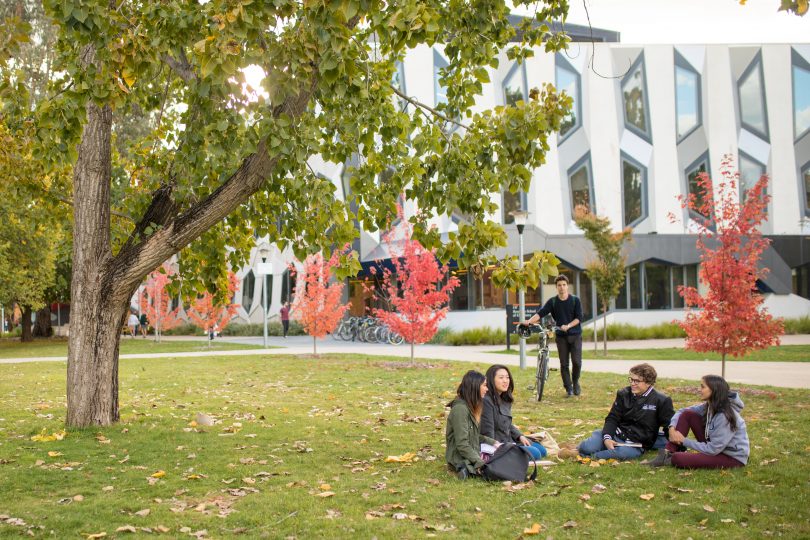
ANU students on campus. About 4000 Chinese students have been held up by the coronavirus travel ban. Photo: ANU.
The Australian National University is offering hardship scholarships and fee relief for new students not able to start their studies by 31 March as a result of the coronavirus travel ban, regardless of the hit to its bottomline.
The ANU said there are about 700 commencing Chinese students eligible for the hardship scholarship and the university will cover course fees for new students who complete the online courses it is offering in semester one 2020.
“Continuing students are not eligible for the hardship scholarship and will pay their fees as normal. However, if they fail their course they can withdraw without financial penalty up until 3 June or repeat the course for free,” a spokesperson said.
The hardship scholarship offer is open to anyone impacted by the current travel ban, including non-Chinese students.
Four thousand of the ANU’s 5000 Chinese students have been caught up in the federal government’s travel ban.
Australia’s universities are believed to earn more than $5 billion a year in tuition fees, with Universities Australia estimating almost 100,000 Chinese students enrolled in Australia are stuck in China or other countries.
The ANU says the cost is still to be determined but its priority is supporting students and their wellbeing.
“We are committed to giving our students in China maximum flexibility, while ensuring minimum disruption for our students on campus,” the spokesperson said.
The federal government decided on Thursday to extend the travel ban to at least February 29.
The ANU said it is being flexible around commencement, withdrawal and deferrals, and is offering remote study options for hundreds of courses. It will also be launching a buddy system for students off campus.
“We will now offer our students in China more than 650 courses they can complete remotely so that they don’t miss the start of semester,” the spokesperson said.
“When these students return to ANU they will be able to slot back into on-campus teaching for their courses.”
Offering online courses is one thing but for Chinese students behind the great firewall accessing them is another.
The ANU said it has been testing its systems to make sure courses can be delivered in China and is confident this is feasible.
“We will continue to monitor our delivery systems as the situation unfolds,” the spokesperson said.
It is still considering how to respond to the needs of students who had arranged on-campus accommodation.
Asked whether it was concerned about the impact of coronavirus and the travel ban on the Chinese student market, the ANU spokesperson said that by Australian standards the university had a small and diverse student population.
The university also maintained a range of revenue streams, with research income remaining the largest source of funding.
The ANU has about 20,000 students, with 32 per cent from overseas, mostly from North Asia.
It was reported last year the ANU earned $320 million from international students in 2028, out of an income of $1.375 billion. In 2018, the ANU announced it was capping enrolments, saying it did want to grow at the expense of quality.
The spokesperson said there had not been any staffing issues or rearrangements due to the Chinese students’ absence, nor had campus businesses been affected.



















